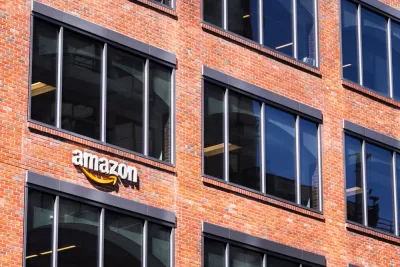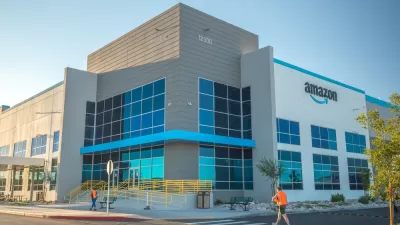Locals aren't happy about Amazon's numerous new distribution facilities in San Francisco, but all of the new facilities are all perfectly legal under the city's zoning code—much more legal than housing, for example.

J.K. Dineen reports (in a paywalled article for the San Francisco Chronicle) on a growing political controversy over Amazon's footprint in San Francisco. The story is directly related to the city's zoning code—specifically, the city's Production, Distribution, and Repair (PDR) zoning designation.
"Amazon has been gobbling up space throughout the southeast corner of the city, taking advantage of zoning meant to preserve blue-collar jobs in a market in which housing and office space have typically generated higher revenues," explains Dineen.
There's a new UltraFastFresh logistics center at 888 Tennessee Street, at the foot of a slow street and across from Esprit Park. There's a 75,000-square-foot warehouse 435 23rd Street and a 112,000-square-foot delivery hub at 749 Toland Street. "But Amazon’s biggest and most controversial incursion into San Francisco is a proposed 725,000-square-foot delivery hub at 900 Seventh St., a 6-acre rectangular parcel in Showplace Square that Amazon bought for $200 million," reports Dineen. Day time workers at the delivery hub have generated 2,800 car trips, according to neighbors quoted in the article.
San Francisco Supervisor Shamann Walton announced new legislation that would enact an 18-month moratorium on all new parcel delivery services in the city. The moratorium would essentially void the city's own zoning. In a separate article for the San Francisco Standard, Kevin Truong details Walton's legislation, noting that the ordinance would require conditional use authorization for new delivery services.
The other zoning catch: the Seventh Street distribution center is only there because a previous housing development was rejected by local stakeholders.
"But while a busy distribution center may feel out of sync with Showplace Square’s current vibe, it is in fact just what city zoning calls for. And [the previous owner of the site] decided to sell the site only after neighbors had rejected its 2018 plan to build about 1,000 units of housing there," explains Dineen.
San Francisco is embroiled in almost continuous controversy about housing development—most recently manifesting in a vacancy tax proposed by one of the city's most consistently anti-development supervisors.
More details about Amazon's expanding footprint in San Francisco, and the local response, can be found in the source article below. For more background on Amazon's growing footprint in the real estate market and its impacts on the land uses and transportation systems of U.S. cities, see the Fulfillment Centers tag on Planetizen.
FULL STORY: Amazon is using San Francisco’s zoning policy to plot a huge expansion in the city. Some locals aren’t happy

Planetizen Federal Action Tracker
A weekly monitor of how Trump’s orders and actions are impacting planners and planning in America.

Congressman Proposes Bill to Rename DC Metro “Trump Train”
The Make Autorail Great Again Act would withhold federal funding to the system until the Washington Metropolitan Area Transit Authority (WMATA), rebrands as the Washington Metropolitan Authority for Greater Access (WMAGA).

DARTSpace Platform Streamlines Dallas TOD Application Process
The Dallas transit agency hopes a shorter permitting timeline will boost transit-oriented development around rail stations.

Maryland Plans Quick-Build Complete Streets Projects
The state will use low-cost interventions to improve road safety in five Maryland counties.

Downtown Los Angeles Gears Up for Growth
A new report highlights Downtown L.A.’s ongoing revival through major housing projects, adaptive reuse, hospitality growth, and preparations for global events in the years ahead.

Supreme Court Landlord Appeal Case Could Overturn Tenant Protections
A legal case claiming that COVID-era eviction moratoriums were unconstitutional could spell trouble for tenant protections.
Urban Design for Planners 1: Software Tools
This six-course series explores essential urban design concepts using open source software and equips planners with the tools they need to participate fully in the urban design process.
Planning for Universal Design
Learn the tools for implementing Universal Design in planning regulations.
Municipality of Princeton
Roanoke Valley-Alleghany Regional Commission
City of Mt Shasta
City of Camden Redevelopment Agency
City of Astoria
Transportation Research & Education Center (TREC) at Portland State University
US High Speed Rail Association
City of Camden Redevelopment Agency
Municipality of Princeton (NJ)




























